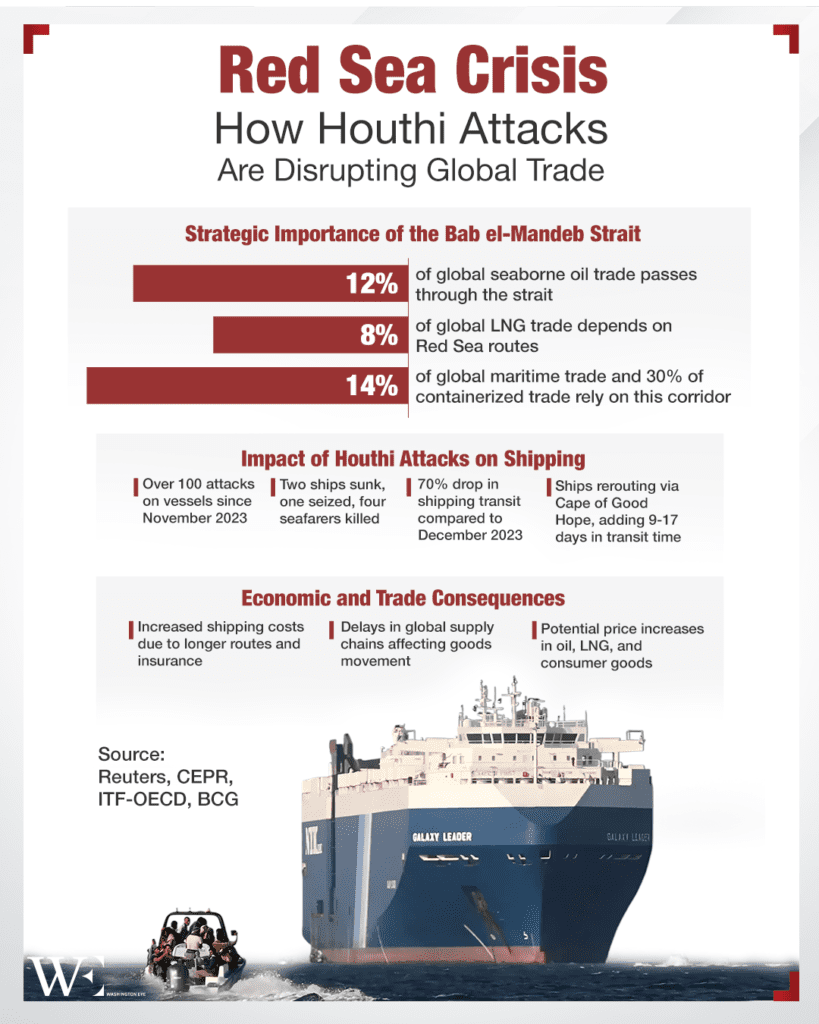In February 2021, the United Arab Emirates (UAE) withdrew from its Assab Naval and Air Force Base in Eritrea, ending a significant military presence in the Horn of Africa. For years, the base served as a crucial logistics hub for the UAE’s intervention in Yemen, allowing rapid deployment of troops and supplies to counter the Iran-backed Houthi rebels.
Now, four years later, the question of who will take over this highly strategic base remains unanswered. However, with growing instability in the Middle East and Africa, the world’s major powers are eyeing the site, each with its own geopolitical motivations.
Assab’s value is undeniable. Located near the Bab el-Mandeb Strait—a chokepoint for nearly 10% of global maritime trade—the base provides access to both the Red Sea and the Indian Ocean. Control over Assab would not only enhance military capabilities in the region but also allow its operator to influence key shipping routes, oversee African security developments, and counter regional adversaries.
The global contest for military dominance in the region has intensified, and Eritrea now finds itself at the center of a high-stakes power struggle.
Russia’s Mediterranean Setback and the Search for a New Base
Russia’s naval presence in the Red Sea has long been limited, but recent events may force Moscow to reconsider its priorities. In early December, the long-standing regime of Syrian dictator Bashar al-Assad collapsed, with Hay’at Tahrir al-Sham (HTS) seizing control of the country. Assad’s Russian backers retreated to their Mediterranean naval base in Tartus, hoping to maintain a foothold in the region. However, Syria’s new leadership wasted no time in revoking Russia’s 49-year lease on the port, throwing Russia’s future in the Eastern Mediterranean into doubt.
The situation rapidly deteriorated when Russian military cargo ships, which had been loitering offshore for weeks, began loading up military equipment for evacuation. A stockpile of high-value assets—including advanced S-400 air defense systems—was staged for departure, fueling speculation that Russia was losing its last stronghold in Syria. With its presence in the Mediterranean at risk, Moscow is likely searching for a new base to anchor its naval power.
Eritrea’s Assab base presents an attractive alternative. It would provide Russia with direct access to the Red Sea and Indian Ocean, enabling it to maintain regional influence despite its setbacks in Syria. Moscow has previously explored options in the Horn of Africa, with reports indicating interest in securing port access in both Eritrea and Sudan. However, Eritrea’s long-standing resistance to foreign bases could complicate any Russian ambitions in Assab.
Israel’s Strategic Dilemma in the Red Sea
For Israel, securing a foothold in Assab would serve a dual purpose: countering Iran’s influence in Yemen and protecting its maritime interests in the Red Sea. The ongoing Israel-Gaza war has escalated tensions across the region, with the Iran-backed Houthis launching a series of missile and drone strikes on Israeli-linked vessels in the Red Sea. The Houthis claim their missiles can reach as far as Eritrea, raising concerns in Tel Aviv about the vulnerability of shipping lanes critical to Israel’s economy.
There have long been reports of Israeli military installations in Eritrea, particularly in the form of intelligence-gathering sites used to monitor regional adversaries. If Israel were to establish a formal naval presence in Assab, it could dramatically enhance its ability to deter Houthi attacks and disrupt Iranian arms shipments to Yemen. However, such a move would likely provoke a strong response from Tehran and its allies, further escalating an already volatile situation.
Iran’s Bid for a Strategic Foothold
Iran has aggressively expanded its influence in the Red Sea over the past decade, largely through its support for the Houthi rebels in Yemen. With Eritrea’s close proximity to Yemen, securing access to Assab would provide Iran with a forward operating base, allowing it to streamline weapons shipments and logistical support for its allies.
Recent reports suggest that Iran has already been using commercial vessels and shadow fleets to smuggle arms to Yemen via Red Sea routes. A base in Eritrea would significantly improve Iran’s ability to project power in the region and threaten Saudi, Emirati, and Israeli interests. Such a development would also complicate Western efforts to secure Red Sea shipping routes, potentially prompting an increase in U.S. and NATO naval deployments in response.
However, Iran faces significant hurdles in securing Assab. Eritrea has historically maintained cautious relations with Tehran and has leaned more towards Gulf Arab states in past diplomatic engagements. Moreover, any Iranian presence in Eritrea would likely trigger immediate military countermeasures from Israel and its regional allies.
China’s Expanding African Footprint
China’s military and economic expansion in Africa has been relentless. In 2017, Beijing established its first overseas military base in Djibouti, just a short distance from Assab. Officially, the base was built to support China’s anti-piracy efforts and protect its vast investments across Africa. However, its strategic implications are undeniable—China now has a permanent military presence near one of the world’s most critical shipping lanes.
Eritrea, already benefiting from significant Chinese investment, could be the next piece in Beijing’s regional puzzle. With its extensive infrastructure projects and financial leverage, China could negotiate favorable terms to secure a presence in Assab, further consolidating its influence in the Red Sea. A second base in the region would provide China with increased flexibility for military operations, intelligence gathering, and power projection across the Indian Ocean.
However, Eritrea’s leadership has historically been wary of foreign military bases, preferring to engage in economic partnerships rather than security arrangements. Whether Asmara would agree to a Chinese naval presence remains uncertain.
The U.S. and NATO’s Interests in the Region
The United States already maintains a significant presence in the Red Sea through its base in Djibouti, home to Camp Lemonnier. The base serves as a critical hub for counterterrorism operations and regional security efforts. Given the rising instability in the Red Sea, Washington may see Assab as a valuable strategic asset to prevent adversarial powers from gaining control.
A NATO presence in Assab would strengthen Western control over Red Sea security and maritime traffic, ensuring that neither China nor Russia gains an advantage in the region. However, Eritrea’s longstanding isolationist policies and strained relations with the West make such a scenario unlikely.
Eritrea’s Calculated Neutrality
Eritrea’s President Isaias Afwerki has spent decades carefully balancing his country’s relationships with global powers. Asmara has consistently rejected permanent foreign military bases on its soil, preferring instead to maintain neutrality while leveraging its strategic position for economic and diplomatic gain.
The fate of the Assab base will ultimately depend on Eritrea’s willingness to break with its policy of non-alignment. Leasing the base could bring financial and security benefits, but it would also risk entangling Eritrea in regional conflicts and global rivalries. The decision will shape the future of Red Sea security and determine which global power will gain the next strategic foothold in one of the world’s most contested waterways.
Conclusion
The Red Sea remains a key battleground in the shifting global power struggle. With Russia losing its Mediterranean base, Israel seeking to counter Houthi threats, Iran looking to expand its influence, China deepening its military presence, and Western powers maneuvering for control, Assab has become a prize that could tip the balance of power in the region.
Whether Eritrea allows a new tenant or maintains its policy of neutrality, the world will be watching closely.

















